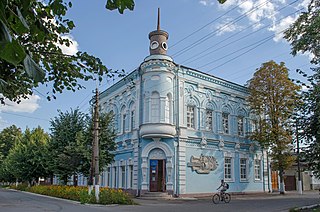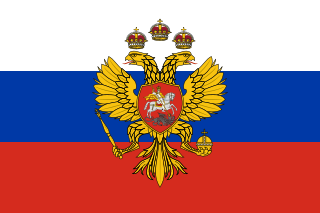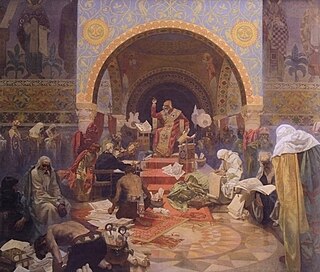Tsarist Russia may refer to:
- Grand Duchy of Moscow (1480–1547)
- Tsardom of Russia (1547–1721)
- Russian Empire (1721–1917)
Tsarist Russia may refer to:

Tsarina or tsaritsa is the title of a female autocratic ruler (monarch) of Bulgaria, Serbia or Russia, or the title of a tsar's wife. The English spelling is derived from the German czarin or zarin, in the same way as the French tsarine/czarine, and the Spanish and Italian czarina/zarina. (A tsar's daughter is a tsarevna.)
Absolutism may refer to:

The Cathedral of the Dormition, also known as the Assumption Cathedral or Cathedral of the Assumption is a Russian Orthodox church dedicated to the Dormition of the Theotokos. It is located on the north side of Cathedral Square of the Moscow Kremlin in Russia, where a narrow alley separates the north from the Patriarch's Palace with the Twelve Apostles Church. Separately in the southwest, also separated by a narrow passage from the church, is the Palace of Facets. The Cathedral is regarded as the mother church of Muscovite Russia. In its present form it was constructed between 1475–79 at the behest of the Moscow Grand Duke Ivan III by the Italian architect Aristotele Fioravanti. From 1547 to 1896 it was where the Coronation of the Russian monarch was held. In addition, it is the burial place for most of the Moscow Metropolitans and Patriarchs of the Russian Orthodox Church and it also serves as a part of Moscow Kremlin Museums.
Golitsyn may refer to:

Novhorod-Siverskyi is a historic city in Chernihiv Oblast (province) of Ukraine. It is the administrative center of Novhorod-Siverskyi Raion, though it is incorporated as a city of oblast significance and does not belong to the raion. Novhorod-Siverskyi is situated on the bank of the Desna River, 330 km from the capital, Kyiv. It hosts the administration of Novhorod-Siverskyi urban hromada, one of the hromadas of Ukraine. Population: 12,647
John or Jack Norris may refer to:

Karachev is an ancient town and the administrative center of Karachevsky District in Bryansk Oblast, Russia. Population: 19,715 (2010 Census); 20,175 (2002 Census); 22,446 (1989 Census).
Russia, also known as the Russian Federation, is the largest country in the world, located in northern Eurasia.

The Tsardom of Russia or Tsardom of Rus', also externally referenced as the Tsardom of Muscovy, was the centralized Russian state from the assumption of the title of Tsar by Ivan IV in 1547 until the foundation of the Russian Empire by Peter I in 1721.
Muscovy is an alternative name for the Grand Duchy of Moscow (1263–1547), the Tsardom of Russia (1547–1721), or (rarely) the Russian Empire (1721–1917). It may also refer to:

The invasion of Russia by Charles XII of Sweden was a campaign undertaken during the Great Northern War between Sweden and the allied states of Russia, Poland, and Denmark. The invasion began with Charles's crossing of the Vistula on 1 January 1708, and effectively ended with the Swedish defeat in the Battle of Poltava on 8 July 1709, though Charles continued to pose a military threat to Russia for several years while under the protection of the Ottoman Turks.
Estland may refer to:

The Russian Empire, commonly referred to as Imperial Russia, was a historical empire that extended across Eurasia from 1721, succeeding the Tsardom of Russia following the Treaty of Nystad that ended the Great Northern War. The Empire lasted until the Republic was proclaimed by the Provisional Government that took power after the February Revolution of 1917. The third-largest empire in history, at one point stretching over three continents—Europe, Asia, and North America—the Russian Empire was surpassed in size only by the British and Mongol empires. The rise of the Russian Empire coincided with the decline of neighboring rival powers: the Swedish Empire, the Polish–Lithuanian Commonwealth, Persia, the Ottoman Empire, and Qing China.
The Battle of Koniecpol was an encounter in November 1708 during the Great Northern War. Near Koniecpol in the Polish–Lithuanian Commonwealth, pro-Swedish forces under Stanisław Leszczyński met with anti-Swedish forces of the Sandomierz Confederation, loyal to Augustus the Strong and allied with Russia. Both armies had a strength of about 10,000 men. Leszczyński was defeated, and thus unable to aid Charles XII of Sweden in his unfortunate Russian campaign.
The Tsarist bureaucracy, alongside the military, the judiciary and the Russian Orthodox Church, played a major role in solidifying and maintaining the rule of the Tsars in the Tsardom of Russia (1547–1721) and in the Russian Empire (1721–1917). In the 19th century, the forces of change brought on by the Industrial Revolution propelled many countries, especially in Europe, to significant social changes. However, due to the conservative nature of the Tsarist regime and its desire to maintain power and control, social change in Russia lagged behind that of Europe.

The emperor or empress of all the Russias or All Russia was the monarch of the Russian Empire.

Tsar, also spelled czar, tzar, or csar, is a title used to designate East and South Slavic monarchs or supreme rulers of Eastern Europe, originally the Bulgarian monarchs from 10th century onwards, later a title for rulers of the Serbian Empire, and from 1547 the supreme ruler of the Tsardom of Russia and the Russian Empire. In this last capacity it lends its name to a system of government, tsarist autocracy or tsarism. The term is derived from the Latin word caesar, which was intended to mean "emperor" in the European medieval sense of the term—a ruler with the same rank as a Roman emperor, holding it by the approval of another emperor or a supreme ecclesiastical official —but was usually considered by western Europeans to be equivalent to king, or to be somewhat in-between a royal and imperial rank.
The Evacuation of Kolkanpää took place between October 18 and 27, 1708 close to Kolkanpää, in the Swedish Empire during the Great Northern War. The Swedes under the command of Georg Lybecker were evacuating their Finnish based army consisting of up to 11,279 men back to Finland, after their failed campaign in Swedish Ingria in an attempt to recover land previously lost to Russia. Fyodor Apraksin, the Russian commander in the area, decided to interrupt the evacuation with between 3,000 and 3,500 men. He decided to wait until only a portion, between 600 and 800 Saxon ex-prisoners recruited into Swedish service, remained on the beaches not yet evacuated, before commencing attack with all his troops. After several assaults the Saxons were soon overwhelmed and almost all of them were cut down or captured by the end of the battle. The Russians had lost about 50 killed and 220 wounded. The Swedes were also forced to slaughter about 4,000 of their horses which could not be evacuated so they would not fall into Russians hands.
Romanov Empire may refer to: